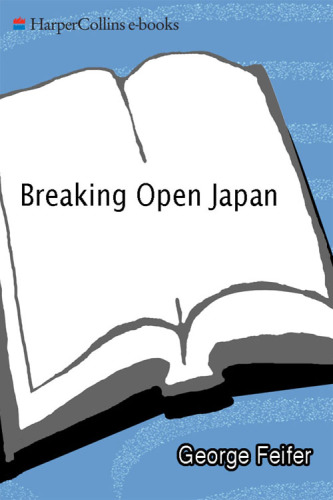
Breaking Open Japan
Commodore Perry, Lord Abe, and American Imperialism in 1853
فرمت کتاب
ebook
تاریخ انتشار
2013
نویسنده
Lauryn Chunنویسنده
Lauryn Chunنویسنده
George Feiferناشر
HarperCollinsشابک
9780062309310
کتاب های مرتبط
- اطلاعات
- نقد و بررسی
- دیدگاه کاربران
نقد و بررسی

Starred review from October 1, 2006
This book, a detailed history of Japan from the American fleet's arrival in Uraga Bay in July 1853 to its departure in June 1854, demonstrates how Japan's powerlessness to oppose the imperialist intentions of Commodore Matthew Perry planted a seed of humiliation deep in the Japanese psyche that would have far-reaching consequences beyond opening up the isolated nation for the first time in centuries. Covering the events leading up to and following the visit, including the fall of the Shogunate and the Meiji Restoration, veteran author Feifer (The Battle of Okinawa) provides rich insight into dueling Eastern and Western mindsets. The Japanese considered outsiders culturally and morally inferior, like beasts that looked human, and the Shogunate was fearful of European imperialism after observing the partitioning of China in the Opium Wars. The Americans had a similar sense of self-regard, believing themselves ideologically and spiritually superior, and the spread of their power and ideas across the Pacific only right and good. Feifer follows the threads of his tale through to the present day, including the most notorious aftershock of Perry's mission, the attack on Pearl Harbor, masterminded by Admiral Yamamoto Isoruku, who said he joined Japan's navy because he "wanted to repay Commodore Perry's visit." The clash of cultures and its legacy are explored thoroughly in Feifer's spirited narrative, making this a must-read for anyone interested in the origin of Japanese-American relations.

December 1, 2006
For veteran scholarly journalist Feifer ("The Battle of Okinawa"), when Americans "opened" Japan by force in the 1850s, they opened a Pandora's box, creating a resentful attitude that eventually led to Pearl Harbor. This genial but tartly moral tale based on English-language sources revolves around two men. Commodore Matthew Perry, a doughty professional and father of the U.S. Steam Navy, had just the right combination of skill and arrogance to sail across the Pacific and deliver a virtual ultimatum to the Japanese. Abe Masahiro was equally doughty in defense of Japanese sovereignty but was a realist who had seen British imperialism humiliate China in the Opium Wars. Perry's visit ignited conflicts within Japan that ended in revolutionary change and the modern nation. Feifer places more weight (both positive and negative) on America's role than do many historians of Japan. But it is bracing to see the 1850s as part of America's long engagement with Asia and to have this wonderful story so well told. Highly recommended for public libraries.Charles W. Hayford, Northwestern Univ., Evanston, IL
Copyright 2006 Library Journal, LLC Used with permission.

























دیدگاه کاربران